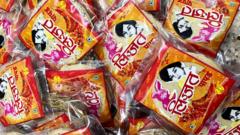Founded in 1959 by seven housewives in Mumbai, Shri Mahila Griha Udyog Lijjat Papad has grown into a thriving co-operative with over 45,000 women members. This initiative not only makes poppadoms but allows women to achieve respect and financial stability while balancing home responsibilities.
Empowerment Through Poppadoms: The Inspiring Journey of Indian Women’s Co-operative

Empowerment Through Poppadoms: The Inspiring Journey of Indian Women’s Co-operative
The story of Shri Mahila Griha Udyog Lijjat Papad showcases how a grassroots initiative transformed the lives of women across India, leading them towards financial independence and empowerment.
On a chilly December morning in Delhi, women wrapped in vibrant saris and warm shawls gathered outside a notable three-storey building. This site represents one of India's oldest social enterprises, the Shri Mahila Griha Udyog Lijjat Papad co-operative, founded in 1959 by seven housewives who created papad, a beloved Indian snack.
Now, 65 years later, the co-operative, based in Mumbai, has expanded to include over 45,000 women members across the country, generating an impressive annual turnover of 16 billion rupees (approximately $186 million). Its products, including detergents, spices, and chapatis, are well-known domestically and are exported to countries like the UK and US. Lakshmi, a 70-year-old manager of the Delhi center, sees Lijjat as a lifeline: "It helps us earn money and feed our families."
Lakshmi joined the co-operative after the death of her husband forced her into the workforce. Initially feeling inadequate due to her limited education, she found purpose and stability through Lijjat. As she now oversees 150 women, her journey reflects how the co-operative empowers women to earn a decent living while managing their home duties.
The process begins each morning when women board a bus to collect pre-mixed dough made from lentils and spices. They return home, balancing their household responsibilities alongside making poppadoms. The once time-consuming task of producing one kilogram of papad has decreased from several hours to a mere half-hour, showcasing the evolution of their skills and efficiency.
Rooted in the socio-economic realities of post-independence India, the co-operative emerged as women faced the dual challenge of seeking work while navigating conservative societal norms. The founders, living in cramped conditions in Mumbai, aimed to support their families by utilizing culinary skills passed down through generations.
Financial assistance from a social worker named Chhaganlal Karamshi Parekh marked the co-operative's early days, enabling the purchase of initial ingredients. As they struggled to find buyers, social workers advocated for their product, and slowly, local shopkeepers began to stock the popular papad.
Encouraged by the growing business, more women joined, not as mere employees but as co-owners, epitomizing equality in decision-making. Current President Swati Paradkar highlights their philosophy: "We share profits and even losses," fostering a sense of community among members.
In 1966, upon recommendation from the Khadi Development and Village Industries Commission, the co-operative finally established the Lijjat brand name, which translates to "taste" in Gujarati.
Generations of women have since experienced the benefits of this initiative. Lakshmi proudly states, "I have put my children through school, built a house, and got them married." At Lijjat, these women not only find financial security but also gain respect and independence—an inspiring testament to the power of collective enterprise.






















